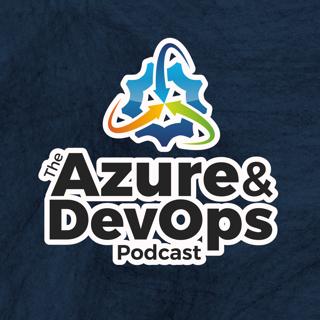
Graham McMillan: Database DevOps - Episode 385
Graham is the Chief Technical Officer at Redgate Software, where he leads the teams behind industry‑leading Database DevOps tools. Before Redgate, Graham's experiences includes multiple decades in complex projects and leadership oversight at many companies including Elsevier, IBM, Sun, BEA, and Oracle. He's also a two‑time round‑the‑world yachtsman, bringing hard‑earned leadership experience from some of the most demanding environments on earth. - Want to Learn More? Visit AzureDevOps.Show for show notes and additional episodes.
19 Jan 36min

Carola Lilienthal and Henning Schwentner: Domain-Driven Transformation - Episode 384
Carola Lilienthal is an architect and coach at Workplace Solutions. She is the author of Sustainable Software Architecture and shares her knowledge at international conferences. Henning Schwentner is a software architect, coach, and consultant at WPS – Workplace Solutions where he helps teams modernize legacy systems. He is a thought leader in DDD and software architecture, and he has also authored Domain Storytelling. Carola's LinkedIn Henning's LinkedIn Want to Learn More? Visit AzureDevOps.Show for show notes and additional episodes.
12 Jan 35min

AD 2025 - The Year of AI-Driven Development – Looking Ahead to 2026 - Episode 383
Today I'm going to reflect back on 2025, highlight some things and project forward into 2026. I think there are some very important developments and changes that we all shipping custom software need to be on top of. Want to Learn More? Visit AzureDevOps.Show for show notes and additional episodes.
5 Jan 12min

Scott Hanselman: The Future of Software Engineering - Episode 382
Scott Hanselman is a teacher at heart. He speaks all over to whoever will listen. He's have written code that you, dear listener, has used. Scott has been blogging, coding, and podcasting a LONG time. He codes, writes, speaks, empowers, promotes, braids, learns and listens - usually not in that order. And he's a Vice President at Microsoft in his day job focusing on Developer Community. You can find him on YouTube, TikTok, Instagram, and Mastodon! His Hanselminutes podcast has surpassed 900 episodes, and his Azure Friday show, over 750 episodes. Connect with him at hanselman.com Mentioned in This Episode Episode 280 Scott Hanselman's TEDx Portland Talk Want to Learn More? Visit AzureDevOps.Show for show notes and additional episodes.
29 Dec 202538min

Glenn Condron: Aspire Strategy for .NET - Episode 381
Glenn is a Principal Product Manager for the App Platform team within the Developer Division at Microsoft, focusing on .NET. Before joining Microsoft Glenn was a developer in Australia where he worked on software for various government departments. Mentioned in this Episode X Account Episode 293 Episode 58 Github Microsoft Devblog Building Cloud Native apps with .NET 8 Simplifying Cloud-Native Development with .NET 8 Want to Learn More? Visit AzureDevOps.Show for show notes and additional episodes.
22 Dec 202552min

Jared Parsons: The Latest with C# - Episode 380
Jared Parsons is a Developer Manager for the .NET Tools team at Microsoft. He's also done extensive work on the C# Compiler Team. Everybody tuning in probably uses his code on a day-to-day basis! Jared started out at Microsoft over 20 years ago as a Developer; moved on to become a Senior Developer; then Principal Developer on Midori OS; and most recently, the Principal Developer on C# Compiler Team, and now a Developer Manager. He's spoken at many conferences, like Microsoft Build and others. Mentioned in this Episode Episode 287 Episode 53 Github - Rosyln Github - Analyzers Github - Csharplang Jared's LinkedIn Want to Learn More? Visit AzureDevOps.Show for show notes and additional episodes.
15 Dec 202542min

Chris Wilke: Generated AI Stories - Episode 379
Chris has 25 years experience as a seasoned SaaS and AI product leader known for practical, people-first strategies to harness value from Generative AI for operational excellence. Chris developed the AI Vantage framework—a strategic approach that emphasizes process-driven transformation to unlock immediate and long-term value from GenAI technologies. He works for Viewport as the Head of Technology and is a respected voice in the AI and product management space, frequently sharing insights through training, blogs, and speaking engagements. Chris holds certifications in SAFe Product Ownership and Pragmatic Marketing, and is an alumnus of Texas A&M University. Mentioned in this Episode Chris' Website Chris' X Account Chris' LinkedIn Want to Learn More? Visit AzureDevOps.Show for show notes and additional episodes.
8 Dec 202538min

Alvin Ashcraft: Community Conferences - Episode 378
Alvin is a senior content developer at Microsoft, author, and longtime leader in the .NET developer community. With over 27 years of experience in software development, Alvin has been recognized as a Microsoft MVP for more than a decade, honored for his contributions to Windows development, Visual Studio, and the broader Microsoft ecosystem. He is currently writing docs for multiple Microsoft technologies. In 2021, Alvin wrote a book for Packt Publishing, Learn WinUI 3.0. This is the first book Alvin authored and has been the technical reviewer for eight other .NET-related titles from Packt. Alvin is a founding board member of the TechBash Foundation and organizer of the annual TechBash developer conference in Pocono Manor, PA. Alvin resides in Pennsylvania with his wife and three daughters. Mentioned in this Episode: LinkedIn Website Alvin's Book Episode 214 Want to Learn More? Visit AzureDevOps.Show for show notes and additional episodes.
1 Dec 202528min





















